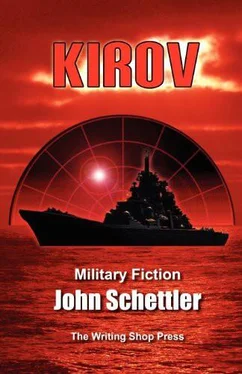John Schettler - Kirov
Здесь есть возможность читать онлайн «John Schettler - Kirov» весь текст электронной книги совершенно бесплатно (целиком полную версию без сокращений). В некоторых случаях можно слушать аудио, скачать через торрент в формате fb2 и присутствует краткое содержание. Жанр: Фантастика и фэнтези, Альтернативная история, на английском языке. Описание произведения, (предисловие) а так же отзывы посетителей доступны на портале библиотеки ЛибКат.
- Название:Kirov
- Автор:
- Жанр:
- Год:неизвестен
- ISBN:нет данных
- Рейтинг книги:5 / 5. Голосов: 1
-
Избранное:Добавить в избранное
- Отзывы:
-
Ваша оценка:
- 100
- 1
- 2
- 3
- 4
- 5
Kirov: краткое содержание, описание и аннотация
Предлагаем к чтению аннотацию, описание, краткое содержание или предисловие (зависит от того, что написал сам автор книги «Kirov»). Если вы не нашли необходимую информацию о книге — напишите в комментариях, мы постараемся отыскать её.
Kirov — читать онлайн бесплатно полную книгу (весь текст) целиком
Ниже представлен текст книги, разбитый по страницам. Система сохранения места последней прочитанной страницы, позволяет с удобством читать онлайн бесплатно книгу «Kirov», без необходимости каждый раз заново искать на чём Вы остановились. Поставьте закладку, и сможете в любой момент перейти на страницу, на которой закончили чтение.
Интервал:
Закладка:
Once in their grasp, he might be treated as an honored guest for a time while they tried to learn all they could from him. He would have power in that event, but what demands could he make of America and Britain-to behave themselves and treat his Mother Russia like a true brother in arms after the war? He knew in his bones that there was no way he could throw in with the Allies against Germany in this war. They would smile, and dissemble, and ask a question here and there as they tried to ferret out the secret of Kirov’s incredible technology, and the unseen pathways that lay ahead in time.
What, would he tell the Americans, that they must not open a second front in Europe and allow the Soviet Union to race to the Rhine? It suddenly occurred to him that he could use his position to fool them if he wished. He could simply tell them that their planned invasion at D-Day would end in absolute disaster, and that they must wait and pursue a more conservative strategy in the Mediterranean instead. Would they believe this?
If he refused to answer their probing questions, would they resort to more unpleasant methods? He could never allow the information in his head to fall into the hands of the Americans and British. What else to do then? What demands could he make of them across a negotiation table, with Mister Nikolin or Fedorov as his translator? The more he thought about the situation, the more ludicrous his position became.
He had put Fedorov’s book aside, his gaze drawn to the portrait of his wife and son on the night stand beside his bunk. His thoughts reached for them briefly, with fond recollection that loosened an emotion within him. Then the crushing insanity of the hour returned as he realized that, in this world, in this moment, his wife had not even been born, and his son no longer existed! An odd thought came to him.
If this was the year 1941, then his mother and father had not even met yet! They did not meet and marry until after the war, and it was some years later, in 1957, that he was born. The odd thought then became an impossible premise in his mind-assuming he lived out the next sixteen years, what would happen on the day he was to be born? Would another Leonid Volsky emerge from his mother’s womb? Would there be two of him, each holding one end of the long cord of life and fate that stretched between them?
Yet Fedorov’s warning haunted him. They were changing things. The British fleet was now maneuvering to intercept a ship they had never encountered in 1941. Men were dying, lives extinguished in one deadly ledger of war, while other men, slated to perish in the planned raids at Kirkenes and Petsamo, may be spared that fate now as the British carriers followed him west. It was too much for him to contemplate, but behind it all the kernel of a worrisome thought was ever present in his mind. How solid and sure was the line of causality that stretched forward from this moment to the distant future he had come from? If these changes rippled forward in time, what might they alter? Could the waves of variation affect the life lines of men aboard this ship? What would happen, he thought, if his parents never met? Would he keel over and die the instant that unseen variation contaminated his own personal line of fate? Or worse, would he simply vanish?
The sudden jarring sound of the ship’s alarm broke his stream of thought, and he stiffened, sitting up in his bunk. Action stations, the sound of surface-to-air missiles firing. Apparently the British were going to continue to force his hand by persisting in these attacks, but what else should he expect? They could only assume he was a hostile German ship, and now that Kirov had demonstrated some of her awesome combat capabilities, the conflict was only likely to escalate.
Now he had Karpov, Yazov and Samsonov in the wardroom, and the Captain was justifying his actions, as the Admiral expected. Yet with every word the man spoke, all Volsky could think about were the men that died in the action the ship had just fought, and those ripples of change and variation that now emanated forward from this moment.
“It was clearly meant as a surprise attack,” said Karpov. “I did what I determined necessary to protect the ship and crew.”
“Yes, but how was it I did not hear a call to battle stations until just before you fired? Are you telling me you did not detect this strike until it was within 50 kilometers?” The Admiral was looking at the chief radar man on duty, Yazov.
“Sir, I-”
“It was my decision.” Karpov interrupted. “When I saw the nature of the threat, over forty incoming aircraft, I elected to utilize our medium range SAM system. It’s rate of fire was superior to that of the S-300s, and it also integrated with our close in defense Gatling guns.”
“That was a proper weapons selection, but you should have sounded general quarters the instant you determined this was an attack.”
“I am sorry, sir, but I wanted to coordinate with Samsonov on the composition of our missile barrages. As you are well aware, we must be conservative with our ammunition.”
It was an easy lie. Karpov would not, of course, say why he had really waited those first minutes without putting the ship at battle stations. He knew the alarm would immediately rouse the Admiral, and send him huffing up to the bridge where he would likely override his decisions. He would lose control of the engagement, and he was eager to handle the matter himself. After all, he was Kirov’s Captain, even if the Fleet Admiral was aboard.
Volsky let the matter go, though he gave Karpov a look that clearly expressed his displeasure. “Forty aircraft? How many missiles did we use to repel this attack?”
“Thirty-two SA-N-92s, sir,” said Samsonov. “Four barrages of eight missiles each.”
“And how many hits?”
“We believe we destroyed twenty four enemy aircraft with missiles, Admiral. One tube failed to sync properly and the missiles did not initialize their search radar sets.”
Volsky shook his head. “Twenty four planes destroyed… Those are heavy casualties for the British. As for the missiles, the damn things have been sitting in the launchers without adequate live fire testing for far too long. Eight missiles failed to initialize? That is unacceptable. I want those systems fully checked and maintained.”
“The Gatling system accounted for six more kills, sir,” said Samsonov.
“Six more? Yes, I heard it firing, and believe me, it was no comfort to know that enemy planes had come so close to this ship-that a plane designed nearly a century ago was actually able to launch a torpedo that could and should have struck us a fatal blow.” Volsky let that sink in hard, staring at each man in the room, his gaze heavy with the full thirty years of his command. Even Karpov, normally jaunty and argumentative, was cowed.
“It will never happen again, sir,” said the Captain at last.
“See that it doesn’t,” said Volsky, though he knew if they held to this course there would likely be other encounters in the days ahead. He sighed heavily, as if releasing the moral weight of what they may have to do if confronted by the British fleet in force.
“This is war now, gentlemen,” said the Admiral. “I had hoped to be cautious here, but the British are forcing us to fight. We are a hard shelled crab with pincers like no other, yet we have just been dropped into a pot of slowly boiling water. We may not die quickly, in one glorious fight, but they will sap the life out of us week after week, and we will die slowly, like that boiling crab. When the last missile has been fired, what then? They can and will lose a thousand men, two thousand men, ten thousand men in the effort to destroy us. They made mistakes, and they have already paid dearly for them, but did you see how they adapted their tactics in this second strike? They split their force by altitude and dispersed their strike sections along a broad front. And it very nearly succeeded! Yet…”
Читать дальшеИнтервал:
Закладка:
Похожие книги на «Kirov»
Представляем Вашему вниманию похожие книги на «Kirov» списком для выбора. Мы отобрали схожую по названию и смыслу литературу в надежде предоставить читателям больше вариантов отыскать новые, интересные, ещё непрочитанные произведения.
Обсуждение, отзывы о книге «Kirov» и просто собственные мнения читателей. Оставьте ваши комментарии, напишите, что Вы думаете о произведении, его смысле или главных героях. Укажите что конкретно понравилось, а что нет, и почему Вы так считаете.












